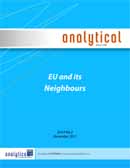The future of the Western Balkans integration within the EU
The future of the Western Balkans integration within the EU
Author(s): Daniel TrenchovSubject(s): Politics / Political Sciences
Published by: Аналитика Тинк-тенк Организација
Keywords: European Union; Western Balkans; unification; integration; interest
Summary/Abstract: Following the key achievements of the European integration, the free movements of people, goods and capital, all the countries from the Western Balkan region strive for the same goal: being a part of the European family. Learning from the failures in the past, Western Balkans (WB) now learned the lesson that the European perspective can be built only through a cohesion, unification and comprehension. This elaborated study explores and identifies the common interest for both the European Union and the WB countries from the integration of this region. On one hand, although not all the countries from the WB live in equal political environments, all of them see a clear benefit in the long run from having a strong multinational entity as an economic partner. Moreover, the full membership gives them the opportunity to gather not only the fruits from the single market and harmonized legal system but also helps in democratization of the region which indirectly leads to greater stability and stopping of the permanent fragmentation. On the other hand, the EU is nowadays facing the reconfiguration of the world geo-politics which imposes stronger interconnections and interdependence of all the European people, states and regions at multiple levels. Also, having in mind the European demographic weakness which increases itself in an exponential manner, the EU already feels the lack of active labor force, without which it is impossible to have a sustainable development. On the security level, it is the interest of the EU to stabilize this region permanently in order to focus on the rapidly changing security challenges. Going even beyond that, the strengthened incorporated WB region in the EU will send an unambiguous signal that the EU plays the leading role in democratization of the societies by spreading common values based on diversity and not on glorification of one specific nation.
Journal: Analytical
- Issue Year: 2012
- Issue No: 08
- Page Range: 45-56
- Page Count: 12
- Language: English

